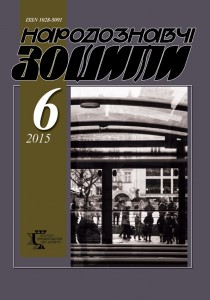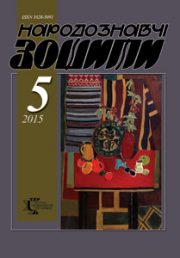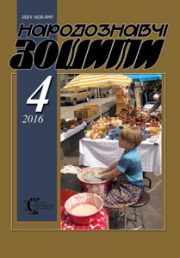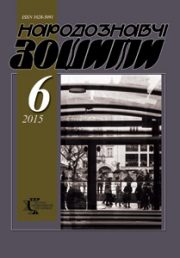
Pavlyuk Stepan. Sociocultural aspects in the investigations of contemporary migration movement as a global element. P. 1254
read »
Mayerchyk Maria, Markov Іhor, Odynets Svitlana. Finding a social anthropology in Ukraine. P. 1257
read »
Kis Roman. Single «me» and the world of senses (analects from the new philosophic book) a text is printed in the author editorship. P. 1262
The author develops the core idea of his earlier works in fundamental sensology. The article claims that universes of sense, which are mental representations of life-worlds, are in complex and mutually determining dynamic of «here-and-now» meanings; and further — the utmost meanings; and ultimately — the Supreme Meaning. The act of existence of our Self consists in the fact, that the Self is determinative generative power of meanings and networks of senses. My self-being as well as co-being and co-presence with Others are fulfilled through a sense-kinesis. The networks of meanings generated by individuals (owing to their sense-generating activities and interpersonal spaces of meaning) form the basic structure (substratum) of all the processes of culture-making.
Keywords: single individual, sense-kinesis, configurations of senses, being, co-being, interpersonal relations, Other, Face of Other.
read »
Pirkko Pitkänen. An Attainment of Intercultural Competence in Transnational Settings Space. Translated from English by Iryna Shvets. P. 1304
Increasing transnational interaction and collaboration provide novel forums for formal and informal learning in transnational settings. Since the beginning of the 1990s researchers have underlined the transformative character of emergent transnational spaces by defining them either as ‘transnational migrant circuits’ (Rouse, 1991), ‘transnational social fields’ (Glick Schiller, Bash & Blanc-Szanton, 1992), ‘transnational communities’ (Portes, 1997), or ‘transnational social spaces’ (Faist, 2004; Pries, 2001). From an educational point of view, a transnational space may be understood as learning environments in which educational actors sustain relations and activities that link together several national territories. In addition to migratory movements, people’s day-to-day transnational ties and activities are important factors in the emergence of educational spaces that transcend geographical, political, social and cultural borders.
In this paper, the term ‘transnational educational space’ is used to describe the ways in which individual or collective actors make use of space in transnational settings, focusing in particular upon questions of empowerment and the related needs for skill acquisition. A fundamental characteristic feature is the continuous circulation of knowledge and know-how in a transnational setting. Transnational expert and diaspora networks in particular play a crucial role when considering the transformation processes underway. In particular, many ICT experts and tertiary level students have adopted highly mobile transnational lifestyles. Not only has the volume of intellectual diaspora increased, but the chains of transnational interaction have also been lengthened and spread considerably.
The emergent transnational educational spaces and the growing cultural diversity in educational environments are creating a necessity for the redefinition of the goals of education: an attainment of intercultural competence is becoming ever more necessary. This article focuses on the characteristics of emergent educational spaces and the competence requirements arising in transnational settings. The background chapter argues that an attainment of intercultural competence is becoming ever more necessary due to the increasing transnational collaboration and cultural diversity in educational and work environments. In the following chapter, it is stated that a successful transnational interaction requires both cognitive, attitudinal and operative dimensions of intercultural competence. Finally, the con ever more necessary cluding chapter will summarise the main challenges arising in increasingly transnational learning environments.
Keywords: transnational dimensions, transnational educational spaces, ways of transnational cooperations, intellectual borders of diaspora, cultural diversity in educational environments.
read »
Savchynskiy Ruslan. Dynamics of social space in the context of ability to permanent development: theoretical and methodological sketch. P. 1313
The article deals with the sociology of social change and sociodynamics problem fields. Basic sociological theoretical and methodological approaches of interpretation and study of social change are described (by P. Sztompka). Specified the categories of social environment and social system as a social space possible states. On the basis of the synthesis of P. Bourdieu, P. Sztompka and N. Luhmann theories, author proposed a sketch-model of the social space, and the mechanisms of its sociodynamics.
Keywords: sociodynamics, evolution, society, social space.
read »
Markov Ihor. Globalization and migrations: theoretical and methodological aspects of studies on sociodynamics. P. 1320
The article based on the author’s research of modern Ukrainian external migration processes, with regard to globalization theories and transnational migration studies. The author outlines his approach to understanding of sociodynamics in the context of globalization, determines the other categories and their relationship within the basic concept.
Keywords: sociodynamics, globalization, migration, identity, eventfulness, time-and-space.
read »
Petro Chorniy. The phenomenon of «ethnicity» in a modern scientific discourse: an introduction to the topic. P. 1331
The article presents a critical review of the main concepts and research approaches explaining the phenomenon of ethnicity: Primordialism, Constructivism, Instrumentalism and the Theory of Ethnos. The author has analyzed the reasons of their appearance and factors that influenced the formation and development of their theoretical and methodological bases. The article also systematizes basic scientific tasks set by researchers while studying the phenomenon of ethnicity, in particular the way it is formed and its influence on the perception and understanding of social reality.
Keywords: ethnicity, culture, identity, group, primordialism, constructivism, instrumentalism, theory of ethnos.
read »
Markov Igor. Migration and ethnicity: some aspects of constructing the horizontal space of cohabitation. P. 1339
This article is based on the results of author’s investigations of processes of Ukrainian labor migration to EU countries. Migration is a field for the study of «social frontier» or, in the words of the German sociologist T. Faist, «the borders of social formations». And not only in the territorial-cultural, but also in the temporal -and- spatial dimension. This article is devoted to the study of horizontal space of communication that is created by migrants’ social networks. Migrants usually not integrating in the host society and not reintegrating in the society of origin, but rather create horizontal space of coexistence, which reproduces the patterns of ethnicity. This is due to the changes of the types of social identities and principles of social identification. The author tries to trace how the factor of ethnicity implements in the construction of social identities in the horizontal space of coexistence.
Keywords: space of coexistence, social identities, principle of «social correlations», mobilities, migrations, ethnicity.
read »
Ivankova-Stetsiuk Oksana. The universal mechanisms of system changes in public religious life: Ukrainian context. P. 1346
The concept of system changes in the forms of social and religious life is proposed and their universal mechanisms are found. The trend to communitization of social and religious life is regarded as the final stage of interaction of socio-religious relations.
Keywords: social andreligious life, mechanisms of change, system, communitization.
read »
Hodovanska Oksana. Everyday life is (not) identical to ethnographic description of everyday life. P. 1356
The author examines the concept of «everyday life» as an element of human existence, which is analyzed in the works of Ukrainian researchers in various humanitarian disciplines. The article defines the similarities and differences of the concept of «everyday life» with an all-encompassing ethnological notion of everyday life.
Keywords: the concept of «everyday life», mode of life, privacy, everyday history, ethnography.
read »
Mayerchyk Mariya. Folklore, romantic nationalism and sexuality: methodological aspects of the history of bawdy folklore records. P. 1362
The paper is dedicated to the methodological aspects of history of bawdy folklore study. In particular, the idea that bowdiness is not a stable, immanent feature of the premodern folklore text, but it is a constructed phenomenon, produced by modern discourses. In the paper the discourse of romantic nationalism and discourse of sexuality are examined. The research is conducted with the involvment of manuscripts by Zorian Dolenga-Khodakovskiy.
Keywords: history of Ukrainian folkloristic, bawdy folklore, discourse, romantic nationalism, sexuality.
read »
Aksakal Mustafa. Approaching Multiple Units of Analysis in Cross-Border Research: Evidence from the Case of Caxcania in Zacatecas, Mexico. Translated from English by Iryna Shvets. P. 1373
By addressing methodological issues of transnational migration research, this paper suggests to focus on various interrelated units of analysis in order to gain a holistic picture of social processes relevant for understanding completely the researched field. To develop this argument ‘methodological nationalism’ is discussed which was criticised for limiting the research focus solely on social processes within national contexts. Based on this criticism, it is argued that migrants’ and relevant non-migrants’ transnationalism can be best studied by focusing on transnational spaces as cross-border units of analysis, as well as by considering multi-sited research sites. To this end, the transnational social space concept and the multisited research are discussed. While approaching social spaces as cross-border units of analysis represents a significant methodological advance, it is stated that in some cases instead of focusing in research projects solely on one particular transnational social space, it may be useful to consider all relevant transnational and non-transnational social spaces, located in the micro, meso and macro level. Particularly, in inquiries that are focused on transnational migration and development, these multiple units of analysis seem to be necessary, not only in order to capture a fuller panorama of the researched context, but also for be able to analyse prevailing relations and interactions between different social spheres. Subsequently, these considerations are illustrated and discussed in the case study Caxcania that was studied empirically between 2011-2012 in Zacatecas, Mexico and California, USA. As this transnational case study shows, the proposed methodological approach can contribute to a broader understanding of existing rationales, interests, social dynamics, and development outcomes.
Keywords: cross-border research, units of analysis, transnational social spaces, multi-sited ethnography.
read »
Kis Oksana. Women’s oral history: western theories, post-soviet contexts, Ukrainian practices. P. 1386
This article provides a critical overview the key methodological debates on goals and peculiarities of using oral history for feminist studies in Western Europe and North America since the 1970s up to the present day. Main trends in women’s oral history as a new research field in the post-socialist countries are discussed as well. The author also pays special attention to developments of women’s oral history in Ukraine.
Keywords: women’s oral history, feminist studies, women’s history, Ukraine.
read »
Lyakhovych Magdalena, Smolchynska Agnieszka. Oral history — methodology of the investigations in modern Polish perspective and its practice. Translated from Polish by Andriy Pavlyshyn. P. 1406
The text is a draft on the development of oral history methods in Poland since the second half of XX century to the first decade of the XXI century. In two parts, the methodological issues and realizations of oral history methods in practice are described. The first part was devoted to the explanation of differences between American and European discourse Polish methodology and description of the methodological approach and scientific discussions conducted in Poland in the field of oral history. The second part is a description of the method of execution using oral history projects and educational documentation made in the first decade of the XXI century in Poland.
Keywords: Poland, oral history, historical research, witnesses of the history, 21th century, source.
read »
Dmytryuk Viktoria, Prigarin Oleksandr. Ethno/photo in anthropological prospects: on methods of processing the private collections. P. 1420
We consider a wide range of opportunities of versification «ethno / photos» as an admission, creation, detection and processing of visual information from the perspective of ethnic specification, methods of processing that source. The questions of methodology in the conditions of use of massive corps sources, as well as their use as a field of knowledge tools (structured interview) are clarified.
Keywords: ethno/photo, visual sources, family photo albums, a procedure of processing family albums.
read »
Sudyn Danylo. Heuristic potential of study of everyday life with the help of quantitative methods. P. 1425
Article offers analysis of possibility of use of quantitative methods in the study of everyday life. First of all, it shows that the everyday life has been object of interdisciplinary research since emergence of scientific interest in this subject. Also article offers new view on exchange of research methods between sociology and anthropology. Though it is widely known, that sociologists started to use qualitative methods under the influence of anthropology, almost no attention is paid to study the reverse process — borrowing quantitative methods by anthropologists. This article contains examples of anthropological researches, which were conducted with quantitative methods. The main part of the article shows an example of successful use of quantitative methods in the study of everyday life — study of housework in Ukraine. European Social Survey database is used for this purpose (5th round — 2010). Author has obtained results that confirm important differences between wives and husbands in the amount of domestic work, which is done by them. Also article offers analysis of factors that influence these differences. Author argues that resulting patterns could be detected only by quantitative methods. Qualitative methods are insensitive to situations, when respondents are unaware of the causes of their certain actions or practices, or when they don’t want to articulate reasons of their behavior to researcher. However, the article also demonstrates the limitations of quantitative methods and stresses the importance of qualitative methods, which must complement them.
Keywords: everyday life, anthropology, quantitative methods.
read »
Odynets Svitlana. Ukrainianness in action: representation of ethnic and national identities in transnational community of the Ukrainian migrant women in Italy. P. 1435
The paper traces the processes of constructing and representation of ethnic and (trans)national identities of Ukrainian migrant women in Italy. The Ukrainian women’s community is regarded not as stable «cultural complex» but as the formation in permanent dynamics, which appears through emerging themselves as a part of Ukrainian national project in the process of transnational interactions.
Keywords: (trans)national identity, ethnic identity, everyday life, women’s migration, Italy.
read »
Cymanow Piotr, Piotrowska Agnieszka. Impact of land fragmentation in south-eastern Poland on migration decisions made by the rural population. Translated from English by Marko Latyk. P. 1447
This academic paper discuses the impact of an adverse agrarian mix and accompanying adverse trends concerning the agricultural production environment on migration decisions. The potential of south-eastern Poland is benchmarked against EU member states. Also, opinions voiced by possible future farm managers about determining factors which facilitate the continuation or discontinuation of the farming activity are presented in the context of the push-pull theory of migration.
Keywords: agrarian mix, human factor, migrations, Lesser Poland Region, Podkarpacie Region.
read »
Fedorchuk Stanislav. Labour migration from Galicia and Volyn to the coal mines of Donbass (october 1939 — january 1940). P. 1455
This article will review the state of the Donbas coal industry before the Second World War, causes and consequences of the crisis on the personnel mines , as well as the first course of organized labor migration from Galicia and Volyn region to Stalin region, its stages and over. Special attention will be devoted to describing and analyzing the activity of management of coal enterprises, party authorities and repressive system on migrant workers in 1939—1940.
Keywords: Second World War, Poland, USSR, Germany, Galicia, Volyn, Stalin region, Voroloshylovhradska region, industrialization, coal industry, economy mobilization plan, labor migrants, repressive system, escape from enterprises.
read »
Trofimova Anna. Labour relations in media discourse in the content of Ukrainian week weekly magazine (july — december 2014). P. 1471
Construction of labour relations in Ukrainian media discourse is analyzed basing on the content of Ukrainian Week weekly. Labour relations are reviewed as relations between employers as subjects of power and employees as the objectified group. The articles of the magazine reproduce the discourse of political and economic power into which the relations of the manager and subordinates are embedded. Labour relations do not have their distinctive frame in the social discourse, and constitute a part of vertical structure of paternalistic power as relations of subordination of employees to the employer, though the discourse of professionalism offers a partial alternative to paternalistic frame. Major characteristics of opinions and preconceptions regarding employers and employees, as well as discoursive features of institutes of political and economic powers, which determine labour relations, are also defined.
Keywords: discoursive regimes of power, labour relations, employers, employees, paternalism.
read »
Nаrvsеlіus Еlеоnоrа. Spicing up memories and serving nostalgias: thematic restaurants and transnational memories in east-central European borderland cities. Translated from English by Oksana Sikorska. P. 1480
The article is a result of field studies on the transformations of multicultural heritage in the east-central European cities of Cracow, Wrocław, Lviv and Chernivtsi. In all these cities, a majority of the pre-war populations (and in Wrocław, practically all pre-war residents) disappeared as a result of WWII. After decades of silence imposed by the ruling communist elites, collective memories of the post-war populations are now surfacing in public discourse. Precisely how the contemporary populations living in the zones of «dismembered multiethnicity» approach the past’s cultural diversity in the everyday life remains, however, an under investigated topic. Under these circumstances, ethnography proves to be an innovative methodological approach particularly suited to studying local expressions of transnational memory. Based on the methodological approach of multi-sited ethnography, the article examines thematic restaurants which allude to cultures of some perished ethnic groups (in particular, Jews, Poles and Germans).
Keywords: ethnic diversity, central and eastern Europe, transnational memories, commercialization, nostalgia, thematic restaurants, borderland cities.
read »
Sudyn Danylo. «Reflexive sociology» in Ukraine. P. 1492
read »
Kosovych-Zaremba Ganna. The Social Anthropology Department at the International Project EURA-NET: Pilot Results. P. 1496
read »
Odynets Svitlana. The Methodological Seminars of Social Anthropology Department. P. 1498
read »
Hodovanska Oksana. International Conference «Oral history of (Un)Resolved Past». P. 1503
read »
Pavlyuk Stepan. Zagreb Scholarly Meeting. P. 1505
read »
Chmelyk Roman, Dyakiv Volodymyr. International Conference “Polish and Ukrainian Ethnology Today. Traditions and Perspectives”. P. 1507
read »
Pavlyuk Stepan. Nobel Laureate in Chemistry Sciences visited The Ethnology Institute. P. 1509
read »







